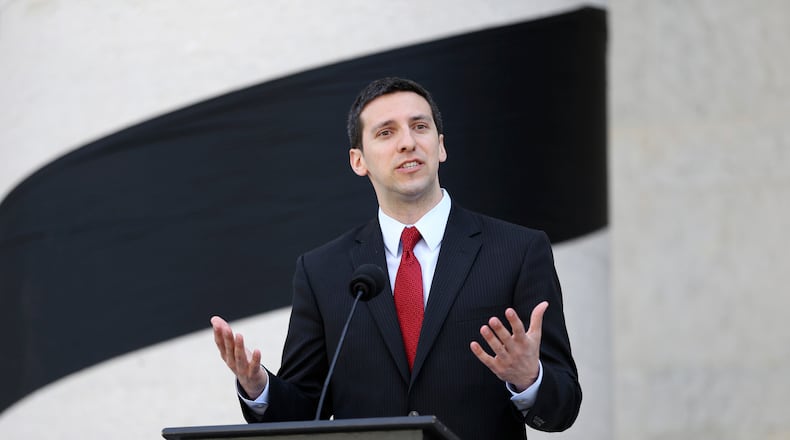One of them is a “disgruntled former employee of Mr. Sittenfeld” identified as “J.K.,” who Sittenfeld’s attorneys do not want to testify, according to their recent motion.
“J.K., like many of the government’s witnesses in this case, entered into a proffer agreement with the government after the FBI learned of criminal acts by J.K. According to that proffer, J.K. can still be indicted for his criminal behavior … J.K. was fired after Mr. Sittenfeld discovered J.K. acted dishonestly,” according to a motion filed on May 27 by Sittenfeld’s attorneys.
Prosecutors intend J.K. to testify about the specific campaigning techniques and fundraising strategies of Sittenfeld and his campaign advisors. But Sittenfeld’s attorneys want the judge to ban J.K.’s testimony because they say it would be unfairly prejudicial and because prosecutors disclosed it to them too late, according to the motion.
“J.K. was not listed in the government’s April 21, 2022, notice letter wherein … witnesses were disclosed. Instead, the government waited until 29 days before trial to provide J.K.’s proffer and related evidence as part of 2,200 pages of … material,” according to the motion.
But prosecutors say there is no legal reason to prevent J.K. from testifying, and that they turned over the vast majority of evidence months ago.
“To the extent the government calls J.K. at trial, this individual will testify as a fact witness, describing firsthand personal knowledge relating to PAC checks the defendant received from the (undercover agents) in this case .. this is direct evidence relating to the bribe payments at issue,” Assistant U.S. Attorney Matthew Singer wrote in a motion filed May 31.
Prosecutors say that J.K. will testify that Sittenfeld intentionally targeted donors with business before the city for campaign contributions.
This is one of several motions that attorneys may discuss with the judge during Sittenfeld’s pretrial conference on Wednesday.
Sittenfeld, who has maintained his innocence, was a rising political star and the front-runner to be the next mayor of Cincinnati before FBI agents arrested him in November 2020 for allegedly promising support for development deals in exchange for $40,000 in donations to his political action fund.
FBI agents interviewed developers and donors who frequently did business at City Hall. Prosecutors summarized those interviews for Sittenfeld’s attorneys. Some of those interviews could be admissible at trial as showing prior behavior from Sittenfeld, according to prosecutors’ court filings.
Some accuse Sittenfeld of being heavy-handed and inappropriate in asking for political donations and using a “subtle message of extortion,’’ according to a government court filing.
Sittenfeld’s attorneys are trying to ban certain testimony about his campaign activity and actions on City Council. They are specifically focused on three individuals who are identified as “J.B.,” “T.G.,” and “C.C.,” according to a defense motion.
“J.B., a businessperson, speculated, without any evidence, that Sittenfeld had taken a public stand against J.B.’s for-profit enterprise in order to support a local non-profit organization because Mr. Sittenfeld wanted to court donors from the non-profit organization,” according to a defense motion to exclude testimony.
“Furthermore, J.B. told a third party shortly after Mr. Sittenfeld’s indictment that J.B. believed the case against Mr. Sittenfeld was unfair and that J.B. disliked the FBI because of J.B.’s own past encounter with the FBI,” according to the motion.
Another individual is T.G., who represented an entity that had parking spaces that were needed by a neighboring health care non-profit.
“Mr. Sittenfeld asked T.G. to see if there would be a possibility of his entity providing unused parking spaces to the neighboring non-profit. After not hearing from T.G. for several months, Mr. Sittenfeld sent an email criticizing T.G. for his failure to respond,” according to the motion.
A third individual, C.C., is a businesswoman who “made inaccurate statements to the government regarding her status as a donor to Mr. Sittenfeld. In fact, C.C. had been a donor to Mr. Sittenfeld multiple times. Yet, C.C. told the interviewing FBI agents that, ‘Sittenfeld would not help’ her because she was not a donor,’” according to the motion.
Prosecutors are also asking the judge to exclude evidence from trial. They do not want jurors to hear from the defense’s two expert witnesses – Washington, D.C. campaign finance attorney Caleb Burns, and former FBI agent and 2014 Democratic nominee for Ohio governor Edward Fitzgerald.
The judge may hold a separate hearing in advance, or during the trial, to listen to these witnesses before deciding what the jury can hear.
Prosecutors also want the judge to limit what Sittenfeld’s attorneys can argue as a proper defense.
“Evidence that ‘this is how fundraising works’ or ‘everyone does it’ is improper and irrelevant … In other words, presenting evidence that others have engaged in ‘x’ conduct and have not been prosecuted, so the defendant’s conduct must be legal, and this prosecution is unfair,” prosecutors wrote.
“Ignorance of the law is not a defense,” prosecutors wrote.
About the Author
